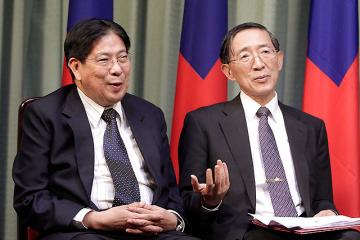From the Borneo Post Online: Ismail Omar: Tackling terrorist intrusion into Sabah big challenge
KUALA LUMPUR: The successful tackle of the armed intrusion into Sabah by terrorists from the Southern Philippines is the sweetest present for Inspector-General of Police Tan Sri Ismail Omar who will celebrate his 60th birthday today.
The intrusion on Feb 11 was a bloody incident in the history of the nation for the security forces after the communist offensive and the Indonesia-Malaysian confrontation in the 1960s.
The group of armed intruders aspired to take Sabah away from Malaysia unlawfully, with the deployment of 150 hired mercenaries.
Ismail, working shoulder-to-shoulder with Armed Forces (ATM) chief Gen Tan Sri Zulkifeli Mohd Zin through the Blue Ocean strategy, launched ‘Operasi Daulat’ from March 5, after a month-long negotiation to send the terrorists back stalemated.
The operation was also launched after eight policemen were killed in Kampung Tanduo, Lahad Datu and in Semporna during the terrorist attacks on March 1 and 2.
During ‘Operasi Daulat’, two soldiers were killed.
The success of the offensive saw 68 terrorists shot dead and 173 detained under the Security Offences Act (Special Measures) 2012 (Sosma), and 443 others detained for numerous other offences.
‘Operasi Daulat’ was concluded after the government set up the Sabah Special Security Area (Esscom), covering 1,400km of the east coast of the state from March 29, similtaneously with the enforcement of the East Sabah Security Zone (Esszone) to ensure security and peace in the state.
Five days after the implementation, Ismail’s capability was once again tested to look after public security when the Dewan Rakyat was dissolved on April 3 for the 13th General Election.
During the campaigning period until polling day on May 5, Ismail successfully ensured the transition process in the selection of the government, despite small incidents of scuffles reported nationwide.
Maybe, this year is the busiest for this Kulim-born to ensure the security and public order in the country. Today is the day for the nation’s top cop to call it a day.
After four decades of good deeds in the ‘Harimau Biru’ team, beginning 1971 as trainee inspector, tomorrow is a day of Ismail’s retirement from the force.
During his career, he held several posts, including prosecution officer at the courts in Ipoh, Perak in 1994; Seberang Perai Tengah district police chief (1996); Bukit Aman CID principal assistant director II (2005); Selangor police chief (2006); Bukit Aman police management director (2007); deputy inspector-general of police (2007); and, inspector-general of police (2010). — Bernama
http://www.theborneopost.com/2013/05/16/ismail-omar-tackling-terrorist-intrusion-into-sabah-big-challenge/
The winners, of course, will rejoice but at the back of their minds, they are figuring out how they can get back their money --- with tripled, quadrupled, or perhaps more profits.
Confrontational politics is contrary to what all experts on conflict management that the best way is to look for win-win solutions. Except those who run as a way of business, meaning those who withdraw after getting paid by whose turfs are affected, imagine everybody engages in mudslinging, vote-buying, intimidation, and other forms of cheating. This breeds only animosities, hatred, and even violence in society.
Perhaps with few exceptions or none at all, candidates’ only motive in running for office is power and money. Those using the people as reason for running is nothing but rhetoric. The people are merely used as rubber stamp.
Power is addictive, while wealth satisfies no one. The duo are inseparable. Power bestows benefits on those who have it, and it is easy to create a system which allows a few to exploit others for personal gain. Similarly or worse, money is treated as god by many, because it can command and it can create more wealth. One MNLF commander in Cotabato once said in 1973, “Money is nothing but if you have no money you are nothing.”
Whether power is for them, or in solidarity with others, the act of redistributing power and resources is a great challenge. The more power is distributed vertically, the more those at the top prefer to see it become aggregated in them and the more they will resist its distribution, using both coercion and persuasion as necessary, usually simultaneously.
To strengthen their control over society, those in power will accept only those freedoms that are granted through them, rather than recognizing the right to self-determination by each individual. They will further legitimize their authority through claiming control of resources. Economic necessity becomes a tool of oppression, thus putting access to resources such as land or the means to making a living at the center of incessant struggle.
Contrary to popular view especially in the Western Hemisphere, election is not the only way to measure whether or not there is democracy in a certain country. In truth, the lesser confrontational politics such as in federalism where the head of state is elected or selected by the majority party or coalition the better chance for it to develop and advance faster. Surveys show that most advanced countries follow the federal or parliamentary systems, because there is less politics and rate of elections.
http://www.luwaran.com/index.php/editorial/item/352-all-candidates-are-losers

